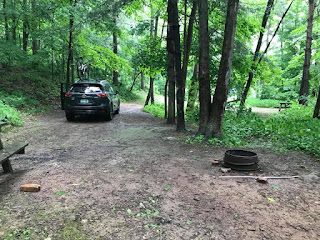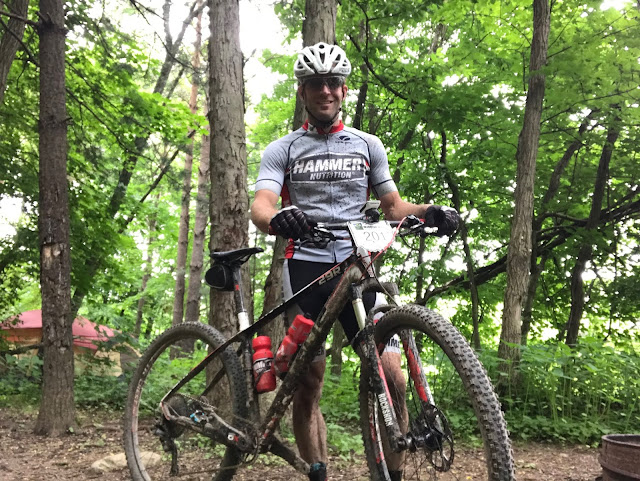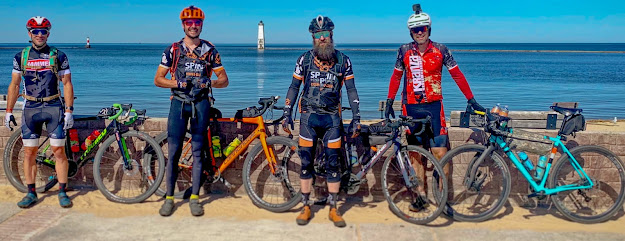Trying to blog about a race I tried to forget - Yes I still finished and did rather well
I am going to start by apologizing for this post, it is a
bit disjointed and has a few holes in it, but the general story is there. I do
not really talk about how sore my forearms got from the trail, stepping in 6”
of mud, or the multiple stream crossings. I really miss out on the general pain
and suffering this 8.5 hours caused and how a lack of sleep really stats to hit
about mile 65-70, but does it really matter? I had a good race, I felt strong
and rode well. I guess I should not wait
nearly two weeks to write a race report. Lesson #2 learned (lesson #1 is in
here somewhere).
On to the actual post - The Mohican 100
How do you write a race report for an event which you tried
to block from your memory the moment you crossed the finish line? I don’t know
either, but here goes nothing:
 With only a four-hour drive to the race I was able to take a
bit more time getting out the door Friday morning which made for a nice change
of pace. Most of the drive was pretty uneventful but about 30 minutes out from
my campground I drove through a rather hard rain. It only took about 5-10
minutes to drive through the storm but I had a strange feeling I would be
seeing it again soon. I stopped for gas and some food in Loudonville and sure
enough as I was getting back in my car the rain caught up with me. Again, it
did not take long to blow through but it sure did make everything very wet. Oh
well, what can be done about the weather.
With only a four-hour drive to the race I was able to take a
bit more time getting out the door Friday morning which made for a nice change
of pace. Most of the drive was pretty uneventful but about 30 minutes out from
my campground I drove through a rather hard rain. It only took about 5-10
minutes to drive through the storm but I had a strange feeling I would be
seeing it again soon. I stopped for gas and some food in Loudonville and sure
enough as I was getting back in my car the rain caught up with me. Again, it
did not take long to blow through but it sure did make everything very wet. Oh
well, what can be done about the weather.
Instead of setting up my tent I went out for a spin to check
out the start line, the first few miles of the course, the finish area and so my campsite could dry out a bit.
Most of this was paved so I stayed pretty dry and clean and had a good idea of
what to expect come Saturday morning.
This is the part of the story where I learned a very
important lesson. I think I do a good job of being ready for things that are
out of my control; be it weather, course conditions, etc. I have a solid plan for
food the evening before a race and I make a fool-proof plan for the morning of
the race. When something out of the ordinary happens I usually have a way to
deal with it and minimize the effect it has on my race day. That said, about
1:00 am Saturday morning I was awoken by quite possibly the worst thing I can
think of: a bunch of drunk guys a few campsites over who have no concept of
volume or courtesy. At first I did not think much of it and just tried to fall
back asleep, but after 10-15 minutes I realized they were not going to stop. As
I was preparing myself to get out of my tent to find them and tell them to
quiet down, I heard someone in a rather authoritative voice tell them to stop.
They loudly said no, the voice said more things and eventually they quieted
down. For a few minutes. Eventually someone again told them to quiet down and
eventually they did. For a few minutes. This process repeated itself until 3:00
am. I do not know if they finally went to bed or if I was just so tired it did
not matter, but either way when my alarm went off at 5:00 I was nothing like
ready to get out of my sleeping bag.
The moral of the story and the simple solution, bring
earplugs.
Back to race day good stuff.
I rode to the start expecting
to be a bit early only to find a surprising number of racers already lined up.
I found a spot near the front and started to chat with some other racers since
the start was still nearly 30 minutes away. Due to some bridge construction in
town the first mile of the race was a neutral rollout and it was a good thing
too as we tried to squeeze three lanes of racers onto a one lane bridge. I did
not hear anyone crash but there was a lot of bumping and jostling going on.
After the bridge the pace picked up a bit as the road rolled
up and down some nice hills. I slowly worked my way towards the front of the group and into the lead pack as we cruised down the first few miles of paved roads. As
we hit the first bit of two track I was at the back of the lead pack which
included both 100 mile and 100 k racers (it was a big lead group and it is a
bit strange not knowing who you are actually racing against). A few miles later
we hit some flowy singletrack with some rocks and roots but it was very
ridable. Until my rear derailleur decided it wanted to act more like a poorly
built automatic transmission than a derailleur. Pedal, shift; pedal pedal,
shift. After a couple miles of this I stopped and adjusted it. It took less
than 2 minutes but it was long enough to lose contact with the group and get
passed by a few racers, but at least now my bike would hold a gear so it was
worth it.
As it turnout out I ended up in a pretty good place, after a
few minutes I found myself riding with Joe Johnson who set a great pace, finishing second in the Masters 100 mile race, about 3 minutes ahead of me. I was able to chat with him over the next few hours about what to expect over the
course since he had ridden it a few time before. This really helped on a course
that was either in great shape and fast or covered in mud and trying to eat
your soul.
Speaking of the course, much of this race really is a blur
but the few things I do remember are:
About 26 miles in we were cruising along a flow-y trail,
after a quick descent there was a hard left turn and the trail went straight up.
Not only was it ridiculously steep, but thanks to a very wet spring the middle
of the trail had eroded away so I had to push my bike up one side of the trail
while walking up the other, extended over a two foot deep ditch that was not
supposed to be there. I think my calves burned more on this hike-a-bike than
any other section all day.
A section of the race went on a horse trail, and this
section had a nice steep descent, which in theory sounds fun, except someone
decided it would be a great idea to put railroad ties across it to help
maintain the trail bed. The downside is the trail basically turned into mini mud
pits at half of these. I was able to ride through most of them but a few were a
bit too muddy and rutted and turned into a half ride/half push to get my front
wheel over and into a decent place below the tie.
I joke that I raced the Cohutta 100 in the mountains of
Tennessee and Georgia and rode up everything then went to Ohio and had to push
my bike up more hills than I can really remember, but that speaks to the great
use of the landscape. The climbs were not as long and sustained as Cohutta, but
there were many that were much steeper and again thanks to a very wet spring
either deep sticky mud or rutted out to the point of being nearly un-rideable. There
was one point where I was riding and two guys about 30 yards ahead of me were
pushing their bikes and going faster than I was. I hopped off my bike and
pushed as well. Sure I could have kept riding, but does it really make sense to
work harder and go slower in a race?
The 100 mile and 100 k race courses merged back together
around mile 84 (I am not sure where they split). This was not much of an issue
until we hit the final aid station (mile 92ish) and the course went back into
singletrack for the remainder of the race. The great thing is everyone I rode
up on was great about letting me get by as quickly as they could. I would
announce rider back and ask to get by when they had a chance and never had to
wait more than 10 seconds to get by. I realize these people were racing too, so
I was sure to thank them all and encourage them as much as I could.
The finish of the race was at the Mohican Adventures
Campground (where I was camping) so when I saw campsites I knew I was almost
there. The trail went back down one of the hills we climbed very early in the
day then hooked up with a paved path for the last ¼ mile. I rolled into the
finish covered in mud and glad to be done.
I finished in 18th place overall in 8 hours, 25
minutes, 45 seconds. The Mohican 100 usually has the most racers of any of the
NUE events and really brings out some tough competition and it did not let down
its reputation this year. As I said earlier, this was a tough course with
conditions that made it even harder; lots of mud, slick rocks and washed out
trails. It was a course that made you work for nearly all of it (there was
a long section of paved bike path that offered a little break – even though most
of that was at a slight incline). When explaining the race to my wife later I
said “that was the second hardest thing I have done on a bike” – Marji Gesick
100, you still hold the honor of the toughest.
Fuel for the day:
I mainly used a combination of Hammer Nutrition Sustained
Energy and HEED for calories. I was able to have pre-mixed bags dropped at three
of the aid stations, which all had ample water to mix. The volunteers at the
aid stations were great about getting me what I needed out of my drop bags and
helping me get back on course as quickly as possible. I used Fizz as my electrolyte
replenishment/hydration, I tried to drink two bottles between each aid station.
I also carried some Hammer gel and Perpetuem Solids as a just in case, but did
not end up needed them. My fuel plan was
spot on with a planned pick me up cup of Coca-Cola and a chuck of PB&J about
halfway though.
Up Next:
The Lumberjack 100 near Manistee, MI( http://lumberjack100.com/) on June 16th. I
have done this race three times so I have a good idea of what to expect but
with the weather forecast expecting temps to hit the 90’s it will have its own challenges.
Results:
Strava:
https://www.strava.com/activities/1613146370
Relive:













Comments
Post a Comment